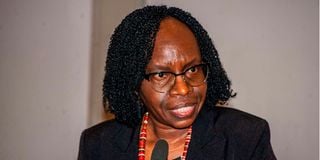Treasury officials withdrew Sh6.3bn without MPs’ approval, audit reveals

Nancy Gathungu the Auditor-General.
What you need to know:
- The government of Kenya, through the National Treasury, acquired the shares in the two banks during the financial year 2022/23.
- The Treasury withdrew Sh6.09 billion on August 5, 2022, and paid Jamhuri Holdings Ltd, a Mauritius-based subsidiary of Helios in a transaction that lacked parliamentary approval.
Top National Treasury officials are on the spot for withdrawing Sh6.3 billion from the Consolidated Fund without the approval of Parliament for the purchase of shares in two African banks during the last year of the administration of former President Uhuru Kenyatta.
A forensic audit by Auditor-General Nancy Gathungu shows that the government, through the National Treasury, acquired shares in Eastern and Southern African Trade Development Bank and Africa-Export Import Bank (AFREXIMBANK) valued at Sh1,296,757,668 and Sh5,013,200,450 respectively all totalling Sh6,309,955,118.
Ms Gathungu says the Treasury exploited the provisions of Article 223 of the Constitution which stipulates that the national government may spend money that has not been approved by MPs if an amount appropriated for any purpose by the National Assembly is either insufficient or a need has arisen for a purpose for which no amount has been budgeted.
“The information on the shareholding of AFROEXIMBANK was received after the special audit report was submitted to the National Assembly. We will verify this information with the National Treasury,” Ms Gathungu said in the audit currently before Parliament.
“However, our request on the Eastern and Southern African Trade Development Bank shareholding has not been responded to date.
As a result, Ms Gathungu said she was unable to confirm the purchase of shares and to determine whether any benefits may have accrued to the government of Kenya.
She said the government of Kenya, through the National Treasury, acquired the shares in the two banks during the financial year 2022/23.
The Treasury was in the eye of a storm last year after it was revealed that officials overruled the Controller of Budget and paid Sh6.09 billion to acquire a 60 percent stake in Telkom Kenya from a UK-based private equity fund, just four days before the August 9, 2022, General Election.
Controller of Budget Margaret Nyakang’o revealed that she refused to authorise the withdrawal of the billions to buy out Helios Investment Partners in Telkom Kenya in a deal that made the company fully State-owned.
The Treasury withdrew Sh6.09 billion on August 5, 2022, and paid Jamhuri Holdings Ltd, a Mauritius-based subsidiary of Helios in a transaction that lacked parliamentary approval.
The deal was closed in the last days of Uhuru Kenyatta’s presidency and came at the height of campaigns to succeed him by then Deputy President William Ruto and the opposition leader, Raila Odinga.
On Wednesday, Mr Sylvester Kiini, the Deputy Auditor General told the National Assembly’s Public Accounts Committee (PAC) that the Treasury purchased the shares in the regional banks through the use of Article 223.
Mr Kiini represented Ms Gathungu when he appeared before PAC to brief it on the findings of the Special Report on the Supplementary Budget Expenditure including withdrawals under Article 223 of the Constitution.
The committee chaired by Nominated MP John Mbadi had on April 26, 2023 year requested Ms Gathungu to undertake a forensic audit on all withdrawals incurred under Article 223 of the Supreme law.
The State auditor said the special audit was also part of the new structural benchmarks for Kenya under the International Monetary Fund Extended Credit Facility Program which required the Auditor General to undertake an audit on the supplementary budget expenditure for the last three years, including withdrawals under Article 223 of the Constitution.
“There has been a gradual increase in requests for funding under Article 223 of the Constitution, from an amount of Sh1.1 billion requested in the financial year 2014/15 to Sh147 .39 billion in the financial year 2022/23. Representing a percentage increase of 13,299 over the nine years,” Ms Gathungu said.
“Further, between the financial years 2014/15 to 2022/23, the national government had already spent between 0.4 percent and 67.8 percent of the funds requested.”
The report indicates that there were requests by five Ministries, Departments (MDAs), and Agencies that were approved by the Controller of Budget but were not disclosed in the information submitted by the National Treasury.
The requests amounted to Sh5.13 billion for recurrent expenditure and Sh2.8 billion for development expenditure.
Six MDAs incurred expenditures totalling Sh47.24 billion over and above the amount approved by the National Treasury as additional funding granted under Article 223 of the Constitution.
“Article 223 of the Constitution is a scene of crime perpetuated by the National Treasury and Ministries and Departments,” Mr Mbadi said.
“I have a Bill currently at the Finance and National Planning to provide mechanisms on how to spend money under Article 223. It requires that before expenditure is incurred under Article 223, approval of the National Assembly within one week.”
He said if the House does not approve withdrawals under Article 223, the Treasury should authorize the use of the Sh10 billion Contingency Fund.
Funyula MP Oundo Ojiambo said the supplementary budget and the use of Article 223 of the Constitution provide a perfect avenue for budgeted corruption.
The committee had required the Auditor-General to analyse the budgeting and procurement process in relation to supplementary expenditure incurred under Article 223 of the Constitution, ascertain the authenticity, effectiveness, and nature of supplementary expenditure incurred and establish whether the approval of the monies used was sought either within two months of the disbursements or at least two weeks after the resumption of the House from recess as contemplated under Article 223(3) of the Constitution.
She was further asked to ascertain the value for money in all the expenditures incurred.





